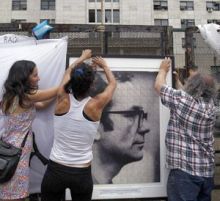According to the International Press Institute’s statistics, 2012 has been the deadliest in 15 years for media workers of the world, with 119 having been killed in the line of duty so far. For example, four journalists were killed in Syria just from November 19 to 21, including the renowned state TV reporter Bassel Tawfiq Youssef. The country witnessed as much as 36 media workers being killed in 2012, according to the experts. Many media workers were killed also in Somalia (16), Mexico (7), Pakistan (5) and the Philippines (5).
According to the media expert Viktoria Siumar, at least 50 media workers have been killed in Ukraine since independence. Beatings and instances of intimidation and preventing journalists from exercising their profession happen almost daily. The late November was no exception. According to the Road Control website, unidentified assailants brutally beat two journalists of the online media, Andrii Dzindzia and Andrii Zhukoven, in Kyiv on November 26. Upon receiving information that the Kyiv police was towing seized cars away to a private impound lot which had no contract with the traffic police, the journalists decided to take a personal look into the situation. However, upon arrival, they were attacked by unidentified persons wearing civilian clothes. According to the Road Control, the police were present during the confrontation, but did nothing to stop the clash which resulted in Andrii Dzindzia being hospitalized with a cut eyebrow and a concussion.
The TVi channel’s creative crew reported a case of preventing journalists from exercising their profession and intimidating them as soon as on the next day, November 27. When the journalists were filming a story about the scandalously expensive repair of the gazebo in the Syniohora Residence, which will cost the state budget as much as 24 million hryvnias, they were intimidated. General Director of the Syniohora Vladyslav Levenets answered with abusive language the TV reporters’ question about reasons for banning access to the residence, while officials of the Office of Regional Development and Construction of the regional state administration went further, hitting a TV camera when asked to comment on this matter.
“Developments in the Ukrainian journalism are very similar to the wider global processes,” the director of the Institute of Mass Information Siumar says. “Our journalists are increasingly placing themselves at the center of events, they are trying to raise burning issues, expose officials who violate the law... In this way, they expose themselves to danger. The media workers should protect themselves primarily through professional solidarity. We should publicize every instance of preventing journalists from exercising their profession, beating or intimidation, and demand that the law-enforcement agencies punish the perpetrators. Death of a journalist is not only a personal, but a national tragedy. Information of great social importance often dies with the killed media workers.”







